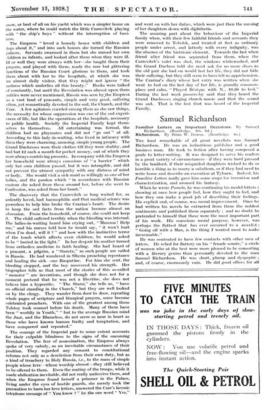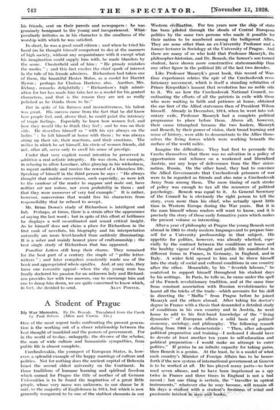Samuel Richardson
Richardson. By Brian W. Downs. (Routledge; tis.)
THE least remarkable of all great novelists was Samuel Richardson. He was an industrious publisher and a good business man. He took to fiction after having composed a, guide to letter-writing. It was designed to serve his readers in a great variety of circumstances—if they were hard pressed by the landlord, if their misguided daughters wished to do so horrible a thing as to marry a subaltern, or if they had need to write home and describe an execution at Tyburn. Indeed, his Familiar Letters really gave him some scope for invention and characterization, and aroused his fantasy.
When he wrote Pamela, he was continuing his model letters : showing at once how people feel, how they ought to feel, and how they can make a good job of describing their feelings. His explicit end, of course, was moral improvement. Once he had written his novels he extracted from them the noblest sentiments and published them separately ; and no doubt he pretended to himself that these were the most important part of his work. His conscious moral purpose, however, was perhaps the flattest that has ever occurred to a novelist : " Going off with a Man, is the thing I wanted most to make inexcusable."
He was contented to have few contacts with other men of letters. He relied for flattery on his " female senate," a circle of women who at the best were more pleased to be consorting with a literary genius than personally devoted to the man Samuel Richardson. He was short, plump and dyspeptic ; and, of course, enormously vain. He did good offices for all his friends, sent on their parcels and newspapers : he was genuinely benignant to the-young and-inexperienced.' Whit • peculiarly irritates us in his character is the smallness of the worship with which he was satisfied.
In short, he was a good small citizen ; and when he tried his hand (as he thought himself competent to do) at the manners of high society, without any acquaintance with it except what his imagination could supply him with, he made blunders by the score. Chesterfield said of him " He grossly mistakes the modes " ; and this fact excites the chief spark of interest in the tate of his female admirers. Richardson had taken one of them, the beautiful HesterMulso, as a model for Harriet Byron ; perhaps for Clarissa Harlowe, also. Another, MrZ. Delany, remarks delightfully : " Richardson's high admix= ation for her has made him take her as a model for his genteel characters, and that is the reason they are not so really polished as he thinks them to be."
But in spite of his flatness and insensitiveness, his talent Was great. His success came from the fact that he did know how people feel, and, above that, he could paint the intricacy of tragic feelings. Especially he knew how women feel, and how they would like to think they feel ; and he was on their side. He describes himself as " with his eye always on the ladies " ; he felt himself at home with them ; he was always sizing up their air, their reactions, and their emotions. The milieu in which he set himself, his circle of women friends, did upt, after all, serve only to swell his sense of prestige.
Under that very explicit moral intention he preserved in addition a real artistic integrity. He was stern, for example, in refusing to allow Lovelace, after glorying in his wickedness, to repent suddenly and receive the reward of a blameless life. Speaking of himself in the third person he says : " He always thought that sudden conversions, such especially, as were left to the candour of the reader to suppose and make out, have neither art nor nature, nor even probability in them; and that they were moreover of very bad example." It is rather, however, conversions that would free his characters from responsibility that he refused to accept.
.Mr. Brian Down's study of Richardson is intelligent and full. Perhaps, at times, there is a strain after the appearance of saying the last word ; but in spite of this effort at brilliance he displays a well co-ordinated and sound critical insight. As he himself does not claim a place for Richardson in the first rank of novelists, his biography and his interpretation naturally are more level-headed than suddenly illuminating: It is a sober and mainly honest piece of craftsmanship ; the best single study of Richardson that has appeared.
Familiar Letters still keep their charm. They remained for the best part of a century the staple of " polite letter- Writers ; and later compilers constantly made use of the Wok and appropriated whole epistles. And, at any rate, they have one romantic appeal—when the shy young man has finally declared his passion for an unknown lady and Richard: on provides her with two answers, one to encourage him and one to damp him down, we are quite concerned to know which?







































 Previous page
Previous page